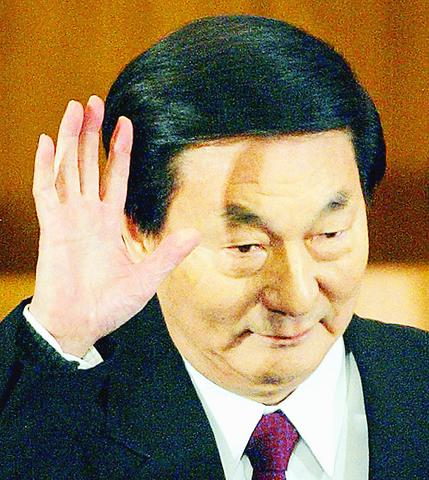In a speech to China's legislature yesterday, Chinese Premier Zhu Rongji (朱鎔基) referred to China and Taiwan as "two countries," but he quickly backed up and referred to Taiwan and China as "two sides."
"We should further expand the scope of personnel visits between the two countries," Zhu said in a swan-song speech to the last session of China's parliament before he retires.
He swiftly corrected himself to say "between the two sides of the Strait".

PHOTO: APN
Zhu's slip of the tongue reminds people of the political row between Taiwan and China in 1999, when then president Lee Teng-hui (李登輝) described cross-strait links as state-to-state relations. China angrily cut off all official dialogue in retaliation for Lee's remark.
Last year, China also lashed out at President Chen Shui-bian's (
Only three years ago, China's premier scowled and wagged his finger as he warned Taiwanese voters that electing an independence-minded president could mean war with China.
But on the eve of his retirement, Zhu yesterday voiced a different message about Taiwan -- an appeal void of threats and filled with soft language that urged the two sides to unify peacefully.
Zhu's remarks came in a lengthy report that opened the annual meeting of the National People's Congress. His speech appeared to be part a new strategy to abandon the old threats and use kind words to lure Taiwan back to what China says is its motherland.
"We must implement the basic principles of peaceful reunification," the premier said in an address heavy with the jargon of China-Taiwan relations.
He said China would "strive for an early resumption of dialogue and negotiation between the two sides."
Beijing would also further expand economic and cultural exchanges as well as promote restoring direct shipping and aviation links, Zhu said.
"We should increase our exchange of views with all political parties and prominent people of various circles in Taiwan," he said.
Zhu did not repeat Beijing's longstanding threat to attack Taiwan if it seeks formal independence or drags its feet too long on unification.
"The strategy is working in the international arena because China is giving the world the impression that it's being reasonable with Taiwan," said Cho Hui-wan, an assistant professor of international politics at National Chung Hsing University in Taichung.
"China is also winning points with some people living in Taiwan," Cho added.
Cho doubts any friendlier approach will bring substantial improvement in relations. Zhu still emphasized that both sides must agree on the "one China" principle.
"Even though China's tone has become softer and more relaxed," Cho said, "they haven't relaxed their principles."
Taiwan said Zhu's speech yesterday didn't show any change in China's policy toward Taiwan, but noted relations between the two were improving.
"Zhu Rongji's speech reiterates communist China's persistent political stance, but we see a continuation of an improving atmosphere from his report," an official at the Mainland Affairs Council said.
"Both sides want to maintain peaceful interaction," said the official, Jan Jyh-horng (

An essay competition jointly organized by a local writing society and a publisher affiliated with the Chinese Communist Party (CCP) might have contravened the Act Governing Relations Between the People of the Taiwan Area and the Mainland Area (臺灣地區與大陸地區人民關係條例), the Mainland Affairs Council (MAC) said on Thursday. “In this case, the partner organization is clearly an agency under the CCP’s Fujian Provincial Committee,” MAC Deputy Minister and spokesperson Liang Wen-chieh (梁文傑) said at a news briefing in Taipei. “It also involves bringing Taiwanese students to China with all-expenses-paid arrangements to attend award ceremonies and camps,” Liang said. Those two “characteristics” are typically sufficient

A magnitude 5.9 earthquake that struck about 33km off the coast of Hualien City was the "main shock" in a series of quakes in the area, with aftershocks expected over the next three days, the Central Weather Administration (CWA) said yesterday. Prior to the magnitude 5.9 quake shaking most of Taiwan at 6:53pm yesterday, six other earthquakes stronger than a magnitude of 4, starting with a magnitude 5.5 quake at 6:09pm, occurred in the area. CWA Seismological Center Director Wu Chien-fu (吳健富) confirmed that the quakes were all part of the same series and that the magnitude 5.5 temblor was

The brilliant blue waters, thick foliage and bucolic atmosphere on this seemingly idyllic archipelago deep in the Pacific Ocean belie the key role it now plays in a titanic geopolitical struggle. Palau is again on the front line as China, and the US and its allies prepare their forces in an intensifying contest for control over the Asia-Pacific region. The democratic nation of just 17,000 people hosts US-controlled airstrips and soon-to-be-completed radar installations that the US military describes as “critical” to monitoring vast swathes of water and airspace. It is also a key piece of the second island chain, a string of

The Central Weather Administration has issued a heat alert for southeastern Taiwan, warning of temperatures as high as 36°C today, while alerting some coastal areas of strong winds later in the day. Kaohsiung’s Neimen District (內門) and Pingtung County’s Neipu Township (內埔) are under an orange heat alert, which warns of temperatures as high as 36°C for three consecutive days, the CWA said, citing southwest winds. The heat would also extend to Tainan’s Nansi (楠西) and Yujing (玉井) districts, as well as Pingtung’s Gaoshu (高樹), Yanpu (鹽埔) and Majia (瑪家) townships, it said, forecasting highs of up to 36°C in those areas